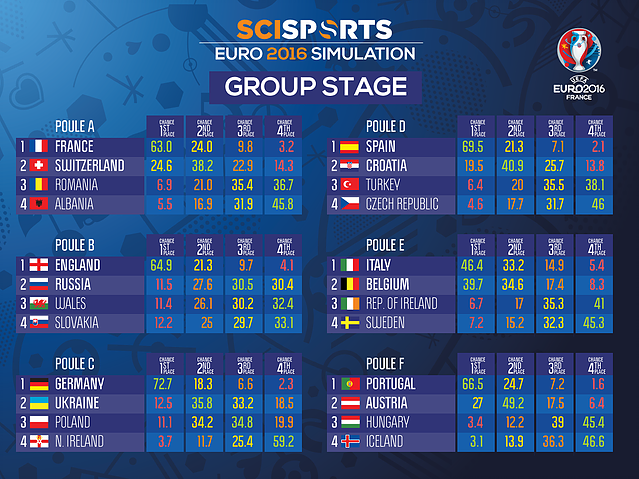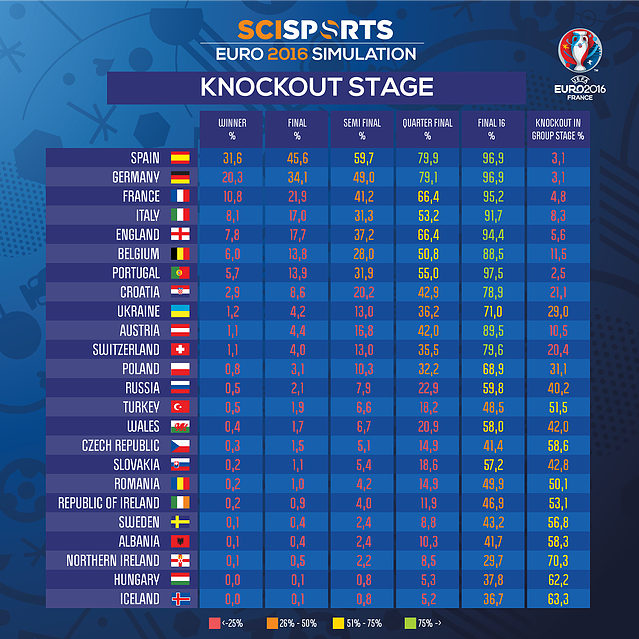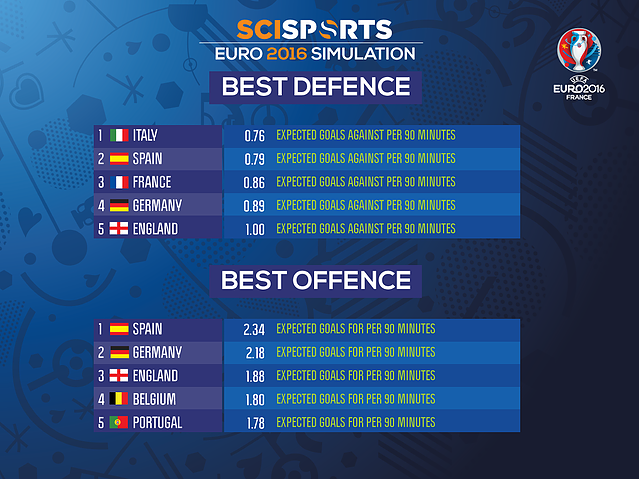
With 24 teams and 51 matches, compared to ‘only’ 16 teams and 31 matches in 2012, the Euro 2016 tournament will have enough room for some surprises along the way. At SciSports we simulated 200.000 European Championship matches, based on our SciSkill Index, to see what would be most likely outcome. Below you can read our findings.
Group stage
After simulating the matches we found that the following standings in the group stages would be most likely:
In Group A, France will most likely finish first with the hosts finishing first in 63% of the simulations. Switzerland and Romania will be battling it out for second place, with the Swiss most likely having the upper hand. Albania, which will make its debut on an European Championship, will probably struggle in this group. The Eagles only have a 22.4% chance of finishing in the top-2, but could benefit from the new format and qualify for the last 16 as one of the best four third-placed teams. The simulation gives them an almost one-third chance (31.9%) of finishing in third place.
Group B has one clear favourite for first place: England. In almost 65% of the simulations, the team finishes top of the group, with Russia and debutants Slovakia and Wales lagging behind around 11 or 12%. The second place however is a toss-up between the other three squads, with no team finishing second in more than 28% or less than 25% of the simulations. The same is true for the third and fourth place, where the differences between the teams are never bigger than 3%. Remarkably, Slovakia has a bigger chance of finishing first than Wales and Russia, but a smaller chance of finishing second or third. Because Slovakia finished first more often than Wales and Russia in the simulation, they are ranked second in the group stage.
Current world champion Germany are the team to beat in Group C. The Germans finish first in 72.7% of the simulations, more than any other team in one of the six groups. The battle for second place between Ukraine and Poland, who organized the Euro 2008 tournament together, will probably be the most exciting part of this group, with Northern Ireland finishing last in almost 60% of the simulations.
Spain, as defending European Champion, finishes first in Group D almost 70% of the time. The chance of them not finishing in the top-two is only 9.2%, so qualification for the knockout stage looks like a near certainty. Croatia will most likely overcome Turkey and Czech Republic in the battle for second place (40.9% to 20% and 17.7%). However, the latter two can of course still qualify for the final 16 by finishing as one of the four best third-placed teams.
Group E is the only group where there is no clear favourite for first place. Italy and Belgium both have a decent shot at finishing top of the group, with the Italians narrowly edging out the Belgiums in the simulation: 46.4% to 39.7%. Sweden and the Republic of Ireland will most likely play a supporting role in the battle for first place, with the team of superstar Zlatan Ibrahimovic not having a clear edge over the Irish squad. In the simulation, the Irish even finish in second or third place more often than the Swedes.
Finally, in Group F, Portugal will most likely only need to see off Austria if they want to finish first. The Austrians finish in first place 27% of the time, but the Portuguese qualify for the next round as group leaders every two of three simulations. Hungary and Iceland will have a difficult time in this group and at least one of them will probably see their European Championship adventure end after the group stage.
Knockout stage
Based on the simulation, we can also determine the odds of each nation reaching a certain round in the knockout stage. Portugal has the strongest chance of reaching the final sixteen, followed by Germany and Spain. However, it is not unlikely for Portugal to not progress beyond the quarter finals, with Germany, Spain, France and England all reaching the semi-finals more often in our simulation.
Croatia and Belgium both reach the quarter finals in our simulation more often than Austria and Ukraine, but, based on our group stage prediction, their likely opponents in the round of sixteen are Italy and Portugal. These two teams reach the quarter finals more often in our simulation, which means Croatia and Belgium are often missing in the most likely quarter final match-ups. Austria and Ukraine, however, can come up against respectively Switzerland and Russia, two nations who do less well in our simulation.
As mentioned above, the teams most likely to feature in the semi-finals are Spain, France, England and Germany. Looking at the simulation of the group stage and the draw in the knockout stage that would follow from that, it is quite possible that these four nations feature in the final four. Spain and Germany are most likely to make their way to the final, with the defending champion being the favourite for holding up the trophy in the end.
If we look at our simulation we can fill in the brackets based on the most likely match-ups each round. The odds of the tournament progressing in this specific way is very slim, but it’s an interesting prediction nonetheless. Defending champion Spain will progress to the final after beating the Republic of Ireland, Ukraine and England along the way. In the final they will come up against Germany, who saw off Wales, Italy and hosts France to get to the final. According to our simulation, the most likely outcome will be the Spaniards collecting a third European title in a row, their fourth European Championship in total.
Top five defence and offence
Finally, in the simulation we also found the best five defences and best five offences of the tournament, based on Expected Goals Against and Expected Goals For. See the lists below.
Spain, Germany and England all three feature in the top five for both defence and offence. Spain even gets second and first place, which corresponds with the results of our simulation. Belgium, not expected to reach past the quarter finals, has an offence worthy of a semi-finalist, while the home crowd can expect a tidy defence from France. The Italians live up to their defensive reputation with a first place in Expected Goals Against.
ABOUT US
ABOUT US

SERVICES
SERVICES










